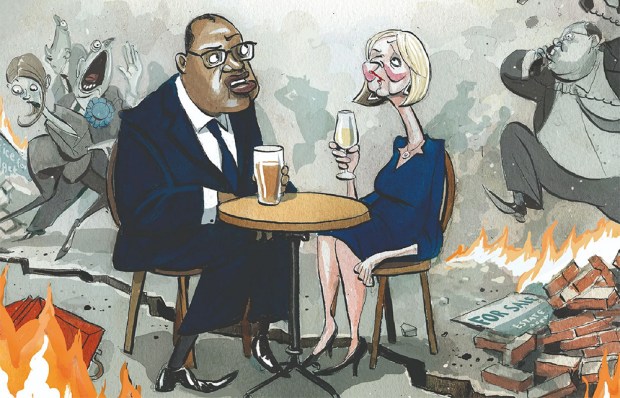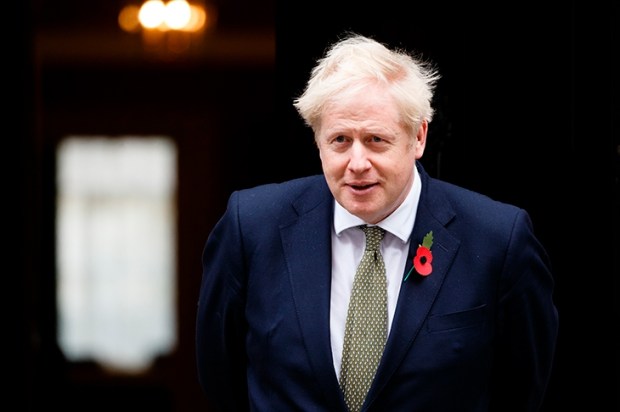One of the favourite phrases of British political commentators is ‘oppositions don’t win elections, governments lose them’. As with all clichés, there is a certain amount of truth to it. But both the Tories and Labour seem intent on testing the maxim to destruction: despite everything the Tories appear to be doing to ensure they lose the next election, Labour is still only ahead by single digits in the opinion polls.
No incumbent party in the western world is finding the present set of circumstances easy. The Covid shutdowns, overly loose monetary policies and Russia’s invasion of Ukraine have sent inflation soaring. In France, Emmanuel Macron has no way of putting together a majority in the National Assembly. In Germany, the SPD – the leading party in the coalition government – is falling in the polls. In the US, the Democrats are likely to lose control of Congress in November.
Yet there is no getting round the fact that the Tories have done immense damage to themselves. Partygate hurt Boris Johnson badly. The no-confidence ballot has left Conservatives in the worst of all possible worlds with the leadership question unresolved one way or the other.
No. 10 has responded to the need to shore up the PM’s position in the parliamentary party with political hyperactivity. Rarely a day goes past without some idea being floated that’s designed to go down well with Johnson’s backbenchers, particularly those on the right who are more likely to have stuck with him in the confidence vote.
The latest hint from Downing Street is that additional grammar schools could soon be opened. But this suggestion is being met with cynicism even from those it’s intended to woo. One senior Conservative MP observes that new grammar schools would be hugely welcome in his seat, but he very much doubts anything will happen before the next election.
Ministers are becoming increasingly concerned about the danger of looking like a government that promises the world but doesn’t deliver. ‘It’s a critique we need to be very careful about,’ admits one of them.
Take the Rwanda policy. It is one thing to have a fight about whether or not asylum-seekers end up being sent to Kigali; it is quite another when the plan is in any case grounded indefinitely by legal complications. If the government thinks a British bill of rights would deal with the bulk of the legal challenges by ensuring narrower interpretations of two key articles of the European Convention on Human Rights and by treating the court’s injunctions as advisory, it would surely have been better to legislate for that before attempting to implement the policy.
There is a similar problem with the rail strikes. Both the Conservative manifesto and the 2019 Queen’s Speech committed the party to ensuring that a minimum service operated during strikes so you couldn’t have the entire network grinding to a halt. But this legislation hasn’t been published yet.
Tory optimists, however, are quick to point to that single-digits Labour lead in the polls, which isn’t disastrous for a government in its mid-term. Yet this says as much about Labour’s limitations as anything else. While Sir Keir Starmer might have been effective at making internal changes designed to limit the power of the Corbynite left, he has struggled to inspire the public: one recent poll had him still trailing Johnson on the question of who would make the better PM.
What does the Labour party stand for post-Corbyn? It is still not clear. In his leadership campaign Starmer suggested he would offer policy continuity with his predecessor, but since he won the contest, he has repeatedly emphasised the break that he represents. At PMQs last week, he even attempted to mock Johnson as the Tory Corbyn.
The move away from Corbynite policy positions is necessary if Labour is to win power, but it is hard to say what would be on a Starmer pledge card. Peter Mandelson recently warned that Labour needed a clearer prospectus if it is to do any better than sneak over the finishing line at the next election.
The problem for any opposition is that policies you come up with can be pinched – and implemented – by the government. During the local election campaign in May, Labour argued that a windfall tax on oil and gas producers would help with the cost-of-living crisis. This claim was always a stretch, given that the policy was only going to bring in around £2 billion. Now the government has not merely implemented a windfall tax, but one that raises more than Labour’s proposal would have done.
There is an area where Labour could be sure the Tories wouldn’t copy them: Brexit. Ever since Tobias Ellwood, the maverick Tory MP, raised the idea of whether Britain should rejoin the single market, various voices in the Labour party have been arguing that it should say more about relations with the EU. Rejoining the single market is being touted by some as a solution to the country’s economic difficulties.
It would be a mistake for Labour to go down this path. The salience of Brexit as an issue has dropped dramatically since 2019. When the political cabinet was told about this some time ago, Johnson mused about whether there might be a way to get the issue going again, to fight the next election on ‘Keep Brexit Done’. Labour would be unwise to play into Johnson’s hands – which perhaps explains why they are letting it be known that Starmer will give a speech setting out that free movement will not return under a Labour government.
British politics is stuck. Unless either main party can get a grip, a hung parliament seems the likeliest result of the next election.
Got something to add? Join the discussion and comment below.
Get 10 issues for just $10
Subscribe to The Spectator Australia today for the next 10 magazine issues, plus full online access, for just $10.
You might disagree with half of it, but you’ll enjoy reading all of it. Try your first month for free, then just $2 a week for the remainder of your first year.















Comments
Don't miss out
Join the conversation with other Spectator Australia readers. Subscribe to leave a comment.
SUBSCRIBEAlready a subscriber? Log in